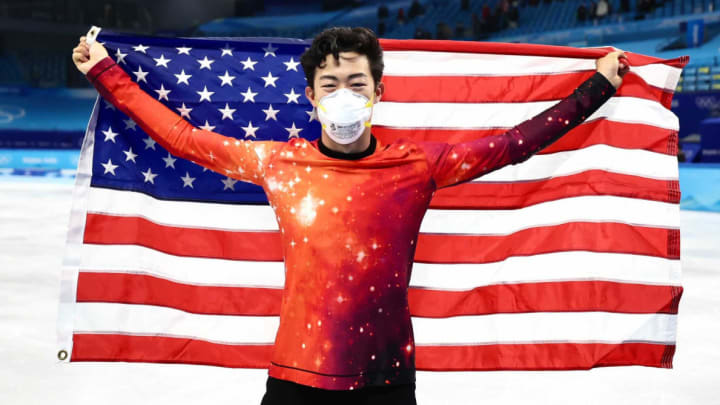Nathan Chen Caps Four-Year Quest for Redemption with Olympic Gold

BEIJING — Two minutes from gold, Nathan Chen remembered to have fun. A lifetime of sacrifices by him and people who love him, four years of replaying a pair of disastrous short programs in PyeongChang, two days of trying to ignore mounting expectations—all that weight fell away on Thursday at Capital Indoor Stadium as the chords swelled.
Halfway through a stunning, electrifying free skate, Chen reminded himself to smile. And as he mimicked joy, he began to feel it too.
“I was kind of grooving a little more and enjoying the program,” he said after he finished with an overall score of 332.60, more than 22 points ahead of silver medalist Yuma Kagiyama, of Japan. Chen became the seventh American man to win Olympic gold in figure skating and the first Asian American man to win a medal of any color.
And it truly was a free skate, at least for a minute or so. “Almost tripped out because of that,” Chen said lightly, “So I was like, All right, I have to lock back in.”
Forgive him for a momentary lapse. The youngest of five, Chen, 22, has been skating almost since he could walk. He showed enough promise that at 11 he moved with his mother, Hetty Wang, to Lake Arrowhead, Calif., from Salt Lake City, Utah, to train with jump specialist Rafael Arutunian. The family was “quite poor,” Chen said. The boy and his mother sometimes lived out of their car. Wang would scrape together enough to pay Arutunian and knowing the family’s situation—and Nathan’s talent—the coach would hand the cash back. “I’ve got enough money,” said Arutunian. “I’m driving a Honda. I’m OK.”
Chen was ready to thank all those people with his performance in PyeongChang. Instead, he flubbed every single jump over his first two events. The first mishap did not affect the team’s bronze, but the second dropped him completely out of individual medal contention. Even the best free skate of the Olympics left him only in fifth place.
“That was a tough Games,” he said. He began working with a sports psychologist about a year ago—“I was like, I’ve never really tried, and I don’t really want to leave a stone unturned,” he said—and he has focused on staying present.
Still, when he crushed his short program in last week’s team event, then crushed it harder four days later in the individual event, he admitted he had felt pressure to redeem himself. After the second one, he released a fist pump—an astonishing display for perhaps the most stoic person here. “I’ve never seen him react like that,” said Mariah Bell, his teammate and one of his best friends.
“The short [program] was a little more emotional,” Chen said after he won gold. “Today was a little more business.”
He was skating last, so he had seen each of his closest competitors falter. Yuzuru Hanyu of Japan, perhaps the greatest male figure skater ever, fell trying to become the first person to land a quadruple Axel in competition, and he fell on his next jump as well. Japan's Shoma Uno fell on a quad flip and Kagiyama took a step on a quad loop. For gold, Chen needed 196.09 points—a score he has failed to beat only twice in the past two years.
Chen strode onto the ice in a red-hued, planetarium of a shirt—”You don’t argue with Vera Wang,” he said. “Whatever she gives you: ‘All right, cool, I’ll take that,”—and reminded himself to stay present. The Elton John medley kicked in: “Goodbye Yellow Brick Road,” then “Rocket Man,” then “Bennie and the Jets,” selected by Chen’s choreographer, Marie-France Dubreuil. Chen said he tries to interpret the music more than embody it, but it was hard to miss the significance of the lyrics.
And I think it’s gonna be a long, long time/
‘Til touchdown brings me ‘round again to find/
I’m not the man they think I am at all/
Oh, no, no, no, no/
I’m a rocket man . . .
That was the moment Chen remembered to smile. As the words soared, so did he, gliding, leaping, spinning. At times it looked as if the music had been written to match the choreography rather than the other way around.
Arutunian said he knew when they arrived in Beijing that Chen would win gold. Bell said she knew Thursday afternoon. Chen said he knew after he landed his triple Lutz–triple toe loop combination, the last jump in a program that featured five quads. All that remained was a dance sequence, an ovation … and a release.
When he finished, he threw back his head and folded in half, dropping nearly to his knees. He ran his hands through his hair and shook his head and clapped. He collapsed onto a bench to await the official announcement of what everyone already knew. He thanked his coach and touched his hands to his forehead and listened to the crowd. He did not have to remind himself to smile.
More Olympics Coverage:
• Chloe Kim Avoids the Pitfalls of Pressure in Beijing
• After Infamous Mistake 16 Years Ago, Lindsey Jacobellis Finally Gets Her Olympic Glory
• Mikaela Shiffrin's Tragic Loss Gives Her Perspective After Latest Olympic Miscue

Stephanie Apstein is a senior writer covering baseball and Olympic sports for Sports Illustrated, where she started as an intern in 2011. She has covered 10 World Series and three Olympics, and is a frequent contributor to SportsNet New York's Baseball Night in New York. Apstein has twice won top honors from the Associated Press Sports Editors, and her work has been included in the Best American Sports Writing book series. A member of the Baseball Writers Association of America who serves as its New York chapter vice chair, she graduated from Trinity College with a bachelor's in French and Italian, and has a master's in journalism from Columbia University.
Follow stephapstein